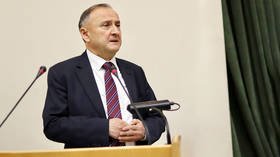Britain loses Olympic medal over sprinter’s doping shame

Team GB has been stripped of the silver medal its men's 4×100-meter relay won at the Tokyo 2020 Olympic Games after the Court of Arbitration for Sport (CAS) confirmed that sprinter CJ Ujah's test sample showed traces of two banned substances.
Ujah's sample was taken after the event in August, when he ran alongside teammates Zharnel Hughes, Richard Kilty, and Nethaneel Mitchell-Blake. According to CAS, traces were found of two banned performance-enhancing substances that help to build muscles – Ostarine and S-23.
Ujah has not challenged the ruling but insisted he was unaware he took the banned substances, which the CAS did not accept. As a consequence, he is suspended from competition and may also receive a ban from the Athletics Integrity Unit.
Ujah apologized to his teammates, their families and teams for "the impact which this has had on them."
"I’m sorry that this situation has cost my teammates the medals they worked so hard and so long for, and which they richly deserved. That is something I will regret for the rest of my life," the 27-year-old former junior 100m world champion said.
Kilty told BBC Radio Tees Sport that he felt sad about the "devastating situation".
"It's absolutely heartbreaking to finally hear the news that the medal is going to be stripped and wiped from history," he added.
"The happiness for me was to win an Olympic medal and give it to my son for him to take it into school and say 'my dad won an Olympic medal'.
"I never got to do that. The motivation is for the next two and a half years to make sure that job gets done properly next time [at Paris 2024]."
Team GB's CJ Ujah releases statement following decision issued by CAS today: "I accept the decision issued by the Court of Arbitration for Sport today with sadness. I would like to make it clear that I unknowingly consumed a contaminated supplement & this was the reason... (1/2)
— Donald Smith (@dpos_smith) February 18, 2022
why an anti-doping rule violation occurred at the Tokyo Olympic Games. " (2/2)
— Donald Smith (@dpos_smith) February 18, 2022
Kilty noted how Ujah explained the supplement he used wasn't batch tested, meaning it was not certified for safe use in line with Informed Sport's standards which British Athletics abide by.
"We get that hammered home by British Athletics and UK Anti-Doping," said Kilty. "They are the rules you have to follow and I have for the last 21 years. It's just devastating that other teammates haven't followed the rules as strictly as the rest of us. And we've been burned by that.
"I am glad CJ has apologized to us, our families and the whole set-up. I'm thankful for the apology but, on the other hand, the rules are rules.
"When you become a professional athlete, the main thing you sign up for is you are on a one-hour curfew for the rest of your life to provide the address and time you will be available for testing.
"You are responsible for everything that goes into your body – everything. You have to be accountable for that.
"It doesn't go through your mind once and it never crossed my mind ever that one of our members failed a test, not in a million years."
Kilty suggested that "only CJ knows the truth". "Either he took drugs or it was contaminated in his supplements which weren't tested," he said.
"Either one is not following the rules. So it's his mistake, he's owned up to it. I'm sure he's very regretful for not following the rules as strictly as he should have done."
Ujah found far less sympathy from a "deeply disappointed" British Olympic Association (BOA).
"We welcome his contrition," it responded in a statement. "That said, this should act as a salutary message for anyone – British or otherwise – who is doping or considering doping as a way of boosting their athletic performance.
"You will get caught. You are not welcome on our team and nor are you representative of our values, or of our nation.
"All athletes, wherever they are from, deserve to go to the start line knowing they are in clean competition. It is with deep sorrow that colleagues and opponents of Ujah were not able to be reassured of this fact in Tokyo.
"On behalf of everyone in British sport, we unreservedly apologize to the athletes whose moment was lost in Tokyo due to the actions of Ujah.
"We are also disappointed for the three colleagues of Ujah who, through no fault of their own, will now lose their silver medals."
Strong statement from the British Olympic Association after CJ Ujah was found to have two banned substances in his urine sample. pic.twitter.com/K1L7EIsIzo
— Sean Ingle (@seaningle) February 18, 2022
Team GB finished second to Italy in the race, ahead of bronze winners Canada and fourth-placed China.
Ujah's case is the third time that a Team GB athlete or team has been stripped of a medal.
Judoka Kerrith Brown failed a drug test at the 1988 Seoul Games, as did skier Alain Baxter at the 2002 Winter Games in Salt Lake City.












